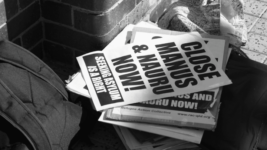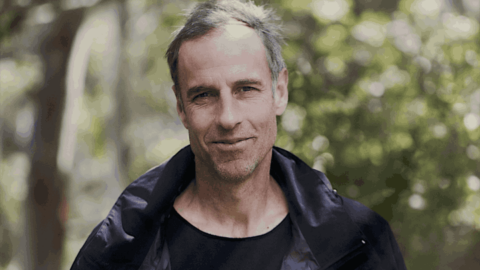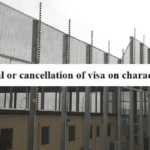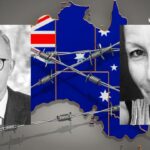Australia is “A Human Rights Pariah”: Senator Nick McKim on Evacuating Offshore Detainees to Safety

On the first day of 2023, Australia continued to hold 159 asylum seekers in offshore detention, with 92 of them in Papua New Guinea and 67 on Nauru.
These people fled persecution in their homelands, arriving by boat in Australian waters, a decade ago. And despite the majority once placed in offshore detention in these poor nations now living in our community, the few dozen left have been indiscriminately singled out for prolonged torture.
In introducing his Migration Amendment (Evacuation to Safety) Bill 2023 on 7 February, Greens Senator Nick McKim has presented the Albanese government with a means by which it can evacuate these people to safety in this country.
McKim set out in his second reading speech on the legislation that those transferred under the provisions of the bill will be supported in community detention until they can be resettled in a third country that’s a party to the UN 1951 Convention Relating to the Status of Refugees.
And the senator underscores that this bill has been drafted with an eye to Labor’s policy settings, so it should follow that the government supports it in the humane manner in which it voted in favour of the 2019 medevac laws.
Ten years more offshore
However, on the same day that McKim was extending the hand of compassion, the Albanese government was gearing up to continue the imprisonment of innocent asylum seekers on an island in the Global South, albeit in an administratively embarrassing way.
Home affairs minister Clare O’Neal presented the Instrument of Designation of the Republic of Nauru as a Regional Processing Country to the lower house, which, after being put to a successful vote, extended the island nation’s status as a refugee dumping ground for another decade.
According to O’Neal, mandatory detention on Nauru is somehow meeting our nation’s “obligations to the world’s displaced and persecuted people”, and offshore processing “has been settled policy on both sides of politics for over a decade”.
The successful renewal of the Nauru instrument means that our government is now planning on keeping an empty immigration detention facility in operational capacity on the island at a cost of $420 million to taxpayers over a three year period.
And this wasn’t the embarrassing part of O’Neal’s announcement, rather, that was the fact that the minister’s department had neglected to update the instrument when it sunsetted back in October.
A warning to the wretched
As the Nauru instrument was put to the vote in the Senate on that same day, McKim explained that offshore detainees have experienced a myriad of atrocities as the system was deliberately designed to “brutalise and dehumanise”: a system Labor has guaranteed for another decade to come.
Sydney Criminal Lawyers spoke to Greens Senator Nick McKim about ending the offshore detention of dozens who’ve been there near on ten years, the rights-denying reasoning behind their continuing to be there, and the need for a “genuine regional approach” to asylum seekers moving forward.

On the second sitting day of parliament this year, you introduced the Evacuation to Safety Bill, which aims to bring the remaining offshore detainees in PNG and on Nauru to Australia.
Nick, what’s the urgency around this bill? And what does it mean for our nation to continue to detain people in a third country a decade on?
Offshore detention has been a dark and bloody chapter in our story, and we want this legislation to help write the ending to that chapter.
We’ve seen people who for 10 years have been brutalised. They’ve witnessed murder, rape and child sex abuse.
They’ve suffered from being deliberately harmed and denied acceptable medical care, and it’s just simply time for Australia to abide by the Refugee Convention that we’re subject to.
There are just under 150 people offshore, and we want to bring them to Australia, so they can be looked after properly.
In terms of what it means, many of these people are coming up on ten years in detention, and some of them are suffering horrendously with physical or mental health conditions.
There’s simply no reason to keep punishing them by maintaining their exile overseas.
The annual cost of keeping asylum seekers on Nauru is $2.1 million each annually. Yet, the majority of the thousands once detained offshore are now living in the Australian community.
So, why is the government continuing to detain a few dozen offshore? What purpose is this serving?
That’s an extremely valid question and one the government doesn’t have an answer for.
But ultimately, it appears the new Labor government is adopting the policy of the Liberal government, which, in turn, was inherited from the Labor Party, who commenced this latest iteration of offshore detention when they were in government in 2013.
The whole principle of offshore detention is twofold. Firstly, it’s to make people’s lives so miserable and to harm them so grievously that they decide to turn back to face the persecution they fled from in the first place.
But secondly, offshore detention is clearly designed to send a message to other desperate people that they should not attempt to come to Australia by boat if they don’t hold a valid visa.
Now, in this regard, the people in offshore detention are like the corpses that used to be impaled on the walls of mediaeval cities to persuade other desperate folk not to enter.
That’s why Amnesty International have described offshore detention as akin to torture, because it is the deliberate harming of somebody in order to coerce an outcome out of them and from others.
The Albanese government commenced the new parliamentary year rushing to renew an instrument that designates Nauru a regional processing country for ten years at a time. This was done months after the instrument had sunsetted.
Labor then announced two further policy changes: permitting refugees, who arrived by boat and are now under permanent protection, to apply for family members to join them, and on Sunday, it made good on a pre-election promise to abolish temporary protection for 19,000 refugees.
What are your thoughts on federal Labor’s approach to refugees since it took office last May?
A couple of thoughts here. Firstly, on the Nauru instrument, that’s simply proof that in many cases the new government is the same rubbish in a different bin.
They are basically adopting exactly the policies of the previous government in relation to offshore detention and Operation Sovereign Borders, both of which are in complete contravention to the Refugee Convention.
Not only are they adopting the same policies, but they’re actually running the same excuses. And I just want to be clear, there is never an excuse for torture.
There has never been a valid excuse for torture, and there never will be. It’s shameful that Labor are adopting the same excuses for torture that Peter Dutton and Scott Morrison perfected.
Secondly, on the conversion of temporary visas, that’s a great result for about 19,000 people who will be guaranteed a pathway to permanence, and we welcome that element of the announcement.
There are others in the legacy caseload, people who arrived by boat prior to the policy change in 2013, whose futures are still uncertain even after the announcement and we need to ensure that everyone entitled to protection receives a pathway to permanent residency and, ultimately, citizenship.
That includes people who had their claims for protection rejected under the Liberal Party’s flawed fast-track process.
Your friend, former Manus Island detainee Behrouz Boochani, appeared on Q&A last week, making some pointed comments directed towards assistant treasurer Stephen Jones, that implied that Labor is scared to take the broader reforms it hinted at over its decade in opposition.
Boochani raised your legislation, in particular. So, in your opinion, is Labor guilty of merely talking big in opposition? And does your bill provide an opportunity for it to overcome this?
There is no doubt that many voted for the Labor Party in the hope that they would be more compassionate towards refugees and so far, in the case of the offshore detention cohort, that has not been the case.
Yes, the Labor Party not acting is political cowardice. They know, as well as any reasonable person knows, that offshore detention is a policy based on cruelty, and it’s a policy that’s simply unnecessary.
That’s why we have introduced this legislation.
As I said earlier, we’re into the tenth year of the brutal regime of offshore detention, one of the darkest and bloodiest chapters in Australia’s story, and we’ve drafted our bill firstly, to try and step around some of the toxic refugee politics that have dominated in Australia over the last decade.
Secondly, it’s been drafted specifically to fit within Labor’s policy settings. That’s critical because when Labor was in opposition, they were happy to support the Greens medevac amendment that did result in a significant number of people being transferred from Manus Island and Nauru to Australia to receive much-needed medical treatment.
This bill has been specifically designed to offer Labor the same opportunity to work in the spirit of cooperation with the Greens to finish that task.
Home affairs minister Clare O’Neil stated last week that forging ahead with regional processing was a given as it has “been settled policy on both sides of politics for over a decade”.
However, last May’s election was marked by what’s since been termed “the greenslide”, which saw a sizable portion of the constituency turning away from the majors and voting green and teal.
So, in this new political climate, with the Greens in balance of power in the Senate, can O’Neil make such assertions about “settled policy”?
No matter how Ms O’Neal tries to frame it, it has been a humanitarian calamity that has destroyed countless lives. That is the critical point about offshore detention.
But politically, it is worth noting that both major parties took policies to the last election around offshore detention and Operation Sovereign Borders, and the primary votes of both major parties went backwards.
There is no doubt that more and more Australians are demanding an end to refugee cruelty and the adoption of humane and compassionate policy frameworks.
And lastly, Nick, as you’ve said, the offshore processing regime is “one of the darkest and bloodiest chapters” this country has seen, and the nation now has the opportunity to end this.
However, the asylum seeker issue in the region is far from over. Amnesty released a report last week about the remerging situation around displaced Rohingyas and the issue with climate refugees has only just begun.
So, is the Albanese government’s decision to keep an empty regional processing facility in operation on Nauru the only solution? How should Australia be approaching this issue going into the future?
What we need is a genuine regional approach. Australia needs to play a leadership role in our region to work constructively to deliver that.
That will require a lot of work, toil, engagement, and it will require Australia being prepared to put in the work. But if we can land a regional solution to this crisis, we can respond to that.
Tragically, there will be an increase in the number of refugees around the world, and we can act in a compassionate way, in a dignified way and in line with our obligations under the Refugee Convention.
I want to make a point about the Nauru instrument that Labor reissued last week: the United Nations High Commission for Refugees was excoriating about Nauru in a letter they wrote to home affairs minister Clare O’Neal. That letter is on the public record.
In that letter, the UNHCR made it abundantly clear that reinstating Nauru as a regional processing country was contrary to Australia’s obligations under the Refugee Convention.
Now Australia used to have a reputation of being a human rights champion around the world. And the way that we treat refugees has played a large part in our reputation being trashed and Australia now having a reputation of being a human rights pariah.







